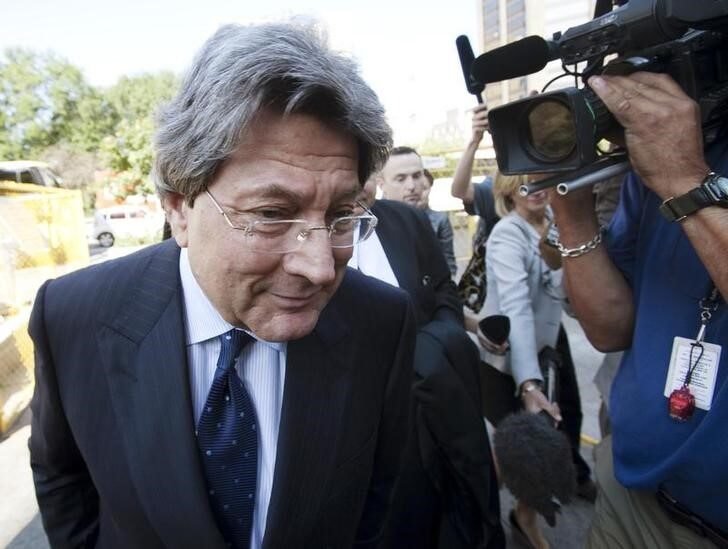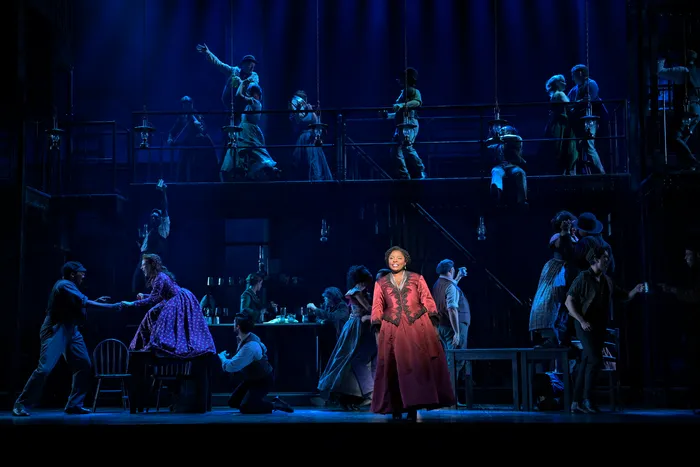Tony Awards, Unpaid Wages, and a Blacklist: The Real Legacy of “Paradise Square”
Kevin Dennis, Matt Bogart, Joaquina Kalukango, Chilina Kennedy, Nathaniel Stampley, with the company in “Paradise Square”/Photo: Julieta Cervantes
by Chris Peterson
On June 12, 2022, Paradise Square stood in the national spotlight at the 75th Tony Awards. The show had 10 nominations total, including Best Musical. Joaquina Kalukango not only won Best Actress in a Musical, but she also delivered a jaw-dropping performance of “Let It Burn”, which has since been referred to as one of the greatest Tony Awards performances of all time. It should’ve been the start of something lasting.
But by this Sunday, June 8, when the 78th Tony Awards begin, it will have been 1,092 days since that night. And what remains is not a legacy, but a cautionary tale. No cast album. No closure. No justice for the artists who brought it to life. Just a mess of unpaid wages, legal battles, and a Broadway system that let it all happen.
The cast actually recorded an album. In April 2022. It’s sitting in a vault, unreleased.
Why?
Because producer Garth Drabinsky, the same Garth Drabinsky who was convicted of fraud in Canada, who served time in prison, and who was attempting a Broadway “comeback” with this show, never paid the artists for the session. And until they get paid, it can’t be released.
So here we are. Three years later. A Tony-winning show with no cast recording, no royalty checks, and no proper ending. Just another cautionary tale.
And we need to talk about it.
Let’s be clear: the work of the artists on Paradise Square deserved better.
This show had one of the most vocally demanding scores of the season, and the actors delivered, night after night.
Was the show perfect? No. But it was a promising work by a talented creative team of composer Jason Howland, lyricists Masi Asare and Nathan Tysen, and a book by Christina Anderson, Larry Kirwan, and Craig Lucas.
And yet, no album. No digital release. No way for fans, historians, or future performers to hear that performance outside of a few grainy bootlegs and that one Tony clip. That alone should be infuriating.
Because cast albums don’t just preserve songs, they preserve voices, artistry, and moments in time that may never be replicated again. They give shows like this a second life. They introduce characters to people who never got to see them live. And when a performance like Kalukango’s is lost behind a wall of unpaid invoices and producer negligence, it becomes more than just a missed opportunity, it becomes a theft of legacy.
And it wasn’t just her. The entire ensemble, the orchestrations, the vocal arrangements — all of it was worthy of preservation. But instead of celebration, those artists are still chasing paychecks. Still waiting for credit. Still hoping their work isn’t erased.
But it’s what it represents that’s even worse.
It represents a system that too often fails the very people who make theatre possible. It represents an industry that celebrates artistry onstage while tolerating exploitation offstage. It represents a pattern where producers with power can act with impunity, where warnings are ignored, and where unions have to clean up messes that never should have happened in the first place.
Let’s talk about Garth Drabinsky.
This wasn’t some passionate underdog chasing one last dream. This was a man with a long, well-documented history of fraud, misconduct, and mismanagement. In Canada, he was convicted of defrauding investors during his Livent days, back when he was producing shows like Ragtime and Kiss of the Spider Woman. He went to prison. He was banned from serving as a corporate director. His crimes weren’t rumors. They were fact. And we warned you.
We published a three-part series laying it all out — the convictions, the lawsuits, the disturbing patterns of behavior that had followed him for decades. We talked about the red flags, the people he hurt, and the unanswered questions that were never fully addressed. We made it clear that letting him back into this industry would be a mistake.
And yet, somehow, Broadway welcomed him back. Not quietly either. He was given a major production, a top-tier cast, and the keys to a multimillion-dollar musical. And worse, he was given power over working artists who had no real choice but to trust him.
And when it all came crashing down, because of course it did, it wasn’t Drabinsky who paid the price. It was the cast. The crew. The musicians. The creatives. They were the ones left with unpaid wages, broken promises, and a show that deserved so much more than the chaos it got.
The same complaints came flooding in. Late payments. Hostile working conditions. Allegations of toxicity and dysfunction. By July 2022, Actors’ Equity had seen enough. They placed him on the Do Not Work list, the most serious action a union can take to protect its members.
Drabinsky fired back with a lawsuit, accusing Equity of defamation and anti-competitive behavior. He dragged the case all the way to the U.S. Supreme Court, and in December 2024, the Court declined to even hear it. That should have been the end of the story.
But it’s not. Because the cast album remains trapped in limbo. The actors. The musicians. The engineers. Everyone who poured themselves into preserving that work is still unpaid. And until that money comes through, the album cannot be released. It doesn’t matter how good the recordings are, and by every account, they’re incredible. They sit in silence, locked away, like so much of this show’s legacy. All because someone in a suit didn’t do their homework. Or worse, didn’t care.
This should also be a wake-up call about vetting producers.
Broadway is hard. It’s expensive. But letting someone with a track record like Drabinsky’s run a major production should’ve raised red flags from the jump. And I’m not saying cancel people for life, but if redemption is going to happen, it needs to be earned. With accountability. With humility. With a plan for protecting the people working under you.
That didn’t happen here. Instead, it’s the artists — the cast, crew, creatives — who are left holding the bag. And the silence that follows is deafening.
This also puts an ugly spotlight on how often artists are expected to accept “delayed” payment or get caught up in someone else’s chaos. “You’ll get paid once we recoup.” “The check is coming.” “It’s in the budget, just wait.” This has become far too normalized in our industry, and Paradise Square is a glaring example of how dangerous that is.
The message this sends to every up-and-coming artist is horrifying: that bad behavior can be forgiven while those who suffer under it are expected to smile, sing, and say thank you.
Here’s the hard truth:
(Photo: Kevin Berne/Handout)
Three years later, the cast of Paradise Square should be celebrating an anniversary. They should be sharing behind-the-scenes photos, trading stories from rehearsals, posting clips of their favorite moments, and reminiscing about the whirlwind that was Tony season. They should be proud of what they built, not haunted by what they endured. Instead, many of them are still waiting to be paid for work they completed years ago. They are still chasing accountability. They are still watching their best work sit in limbo, invisible to the world.
Three years later, high school drama students should be discovering the score through a cast album. Theater kids should be singing these songs at auditions, belting them at open mics, studying them for senior projects. Music directors should be analyzing the orchestrations. Regional theaters should be dreaming of future productions. Instead, those students are Googling why the album does not exist, clicking into Reddit threads and outdated press releases, piecing together the mess that buried this show. They are being introduced not to the music, but to the controversy.
Three years later, the best vocal performance of the 2021–2022 Broadway season, maybe of the entire decade, is locked in a vault. Joaquina Kalukango left everything on that stage. The kind of performance that does not just earn a standing ovation, it earns a place in history. And it is sitting on a hard drive, unheard. We are talking about a Tony-winning performance that cannot be taught, cannot be shared, cannot be preserved, all because of unpaid invoices.
And unless something changes, unless someone steps up, takes responsibility, and does what should have been done from the start, it will stay there. Silenced. Unavailable. Forgotten by the industry that should have protected it. And that, more than anything, is what makes this anniversary feel less like a celebration and more like a memorial.
So, Garth, pay the artists. Release the album. Restore a bit of the dignity that was lost along the way.
Because Paradise Square didn’t deserve to vanish. And its cast sure as hell didn’t deserve to be forgotten. Not after what they gave. Not after what they endured. Not after 1,092 days. Enough already.


